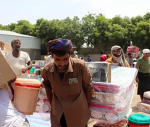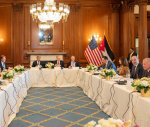You are here
Untimely Russo-Turkish crisis
Dec 01,2015 - Last updated at Dec 01,2015
The last thing the powers engaged in a difficult fight against Daesh needed to inadvertently slip in was a crisis among them.
The so-called war on terror, specifically targeting Daesh at this stage, had already been struggling tirelessly to prove its effectiveness; it did not need a strategic setback, a critical conflict between two major allies supposedly fighting a common enemy.
Aviation rules do indeed require strict respect for other states’ airspace. As sky traffic is getting busier with time, such rules need constant updating and review.
Violations, however, also very common, are rarely met with force, and definitely not against civilian flights.
In war zones the situation may differ. But even then, even if not among allies, a straying military plane may not be shot down unless hostile intent is proven or at least suspected.
It is not easy at this stage to determine the measure of applicability of the said rules to the incident last week that resulted in the shooting down of a Russian fighter jet by the Turkish air force when the plane entered Turkish space and ignored repeated warnings, according to a Turkish account that the Russians denied.
Neither does that really matter anymore, with the consequences of the unfortunate incident getting out of hand.
What matters more is the possible effect of such a strategic flaw on the war on Daesh.
A global coalition was formed to combat Daesh, first in Iraq then in Syria, in the summer of 2014. Dozens of major world powers, including the United States, which took a leading role in the campaign, committed to fight Daesh and to help local armies dislodge its forces from the large areas the group occupied and took full control of in Iraq and Syria.
The idea was to combine direct military action with other measures: prevent the inflow of volunteers from any world country to join Daesh armies; deprive Daesh of financial resources by destroying its oil refining and oil selling apparatus; orchestrate cultural and educational campaigns to fight the very weird ideology of such extremist organisations by mobilising all religious and educational institutions towards that end.
So far, and despite major efforts, Daesh remains in control of most of the areas it originally conquered; it continues to commit the most barbaric atrocities and to enlarge the scope of its terror attacks far beyond the region of its operations and existence; it continues to get large numbers of recruits and apparently, according to repeated reports, the organisation continues to sell oil and generate substantial financial income.
The group seems to also be fully able to utilise electronic facilities for its communication, propaganda, outreach and even terror operations.
Additionally, Daesh forces are still fighting well and seem to have regular supply of arms, military gear and ammunition to sustain its war against the rest of the world.
Russia’s entry with full force into the Syrian theatre was hoped to make drastic changes on the ground, but that is hardly the case yet.
It is quite difficult to understand that two super powers — the US and Russia — most European powers, Turkey, some Arab states and many others, with the rest of the world and the United Nations strongly behind them are unable to crush a dangerous organisation that is calling openly, and indeed acting accordingly, to destroy international peace, threatens the lives of peoples and nations, undermines civilisation and human values, spreads fear and hatred, promotes religious wars and sectarianism, violates individual freedoms and basic human liberties and, worst of all, uses the most lethal terrorist tactics in pursuit of its outrageous objectives.
The latest wave of terrorist attacks claimed by Daesh in Europe, Africa and the Arab world, and the hundreds of innocent lives lost require radical revision of the anti-terror strategy, at least where the immediate initial stage is concerned.
Let us hope the recent crisis between two major allies in this critical fight against a deeply entrenched terrorist network will not lead to additional setbacks in this critical war.
Both Turkey and Russia have key roles in resolving the Syrian crisis. It took years of unnecessary fighting, with unprecedented death and destruction, to reach agreement that fighting terror must precede any political settlement in Syria.
Unfortunately, consensus on such a scheme remains hesitant and far from stable.
The controversy among participants over the future of Syrian President Bashar Assad continues to undermine the plan.
Time is not on the side of dithering and conflict extension.
As all international crises, the Russo-Turkish impasse will hopefully be soon reconciled.
There is no question that the incident was ugly. The Turkish president did wish it did not happen and would not happen again.
Let us hope that a combination of both wisdom and positive practical considerations required to confront the aggravating situation will eventually prevail.
If there is agreement on how to sort out the priorities regarding the Syrian situation, why allow any incident, no matter how legitimately disturbing and serious, distract international action urgently needed to protect world peace and security?













